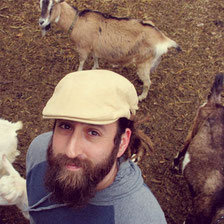Nati Passow
I enjoyed reading Rabbi Sid Schwarz’s opening essay to his book, Jewish Megatrends. Much of what I encountered reflects my own experience growing up in the Jewish community, and working in it for over fifteen years as an informal educator and non-profit director. While I agreed with the concept of the tribal and covenantal Jew, I found the terminology to be a little counter-intuitive for me. Using this analysis, I would generally fall into the Covenantal category, although I connect much more with the language of Tribal Judaism-seeing Judaism as a distinct tribe (as opposed to a covenantal religion), even while valuing other traditions and all people equally alongside my fellow tribe-mates.
Semantics aside, I thought the analysis of the current state of American Judaism was, for the most part, accurate. In particular, I think that both Generation X and Millennial Jews have a more universal worldview than the baby boomer generation, and are often uncomfortable with language and activities that show preference to Jews and/or Israel simply out of ethno-centrism or protectionism. Additionally, I have repeatedly witnessed the “Birthright effect” of creating the expectation that Judaism should be free or subsidized to the point where it is not valued as much as other things in a person’s life that they are willing to pay for.
The explanation of the impact of the private sector within the Jewish community is also an idea that resonates with me. As I have created and developed the Jewish Farm School as a non-profit over the past ten years, I am all too familiar with the challenges of being so heavily dependent on charitable giving in order to keep the project going. I am fortunate enough to have been part of several incubator programs within the Jewish non-profit world that are meant to support innovative projects and leaders, and I have seen many talented individuals get discouraged as effective initiatives close up shop due to lack of resources. Some of the most creative and engaging leaders that are actually able to make Judaism alive and appealing are spending valuable time and energy raising money for their programs, instead of focusing on the content that would best serve the community. Learning from models in the secular world, such as the B Corp, I think the Jewish community can do so much more to embrace a market driven approach to reaching people and addressing social and environmental challenges.
I believe the work of the Jewish Farm School is aligned with the first three of the four proposals, chochma, tzedek, and kehillah. Our programs at the nexus of Jewish tradition, environmental sustainability, and social justice bring the wisdom of Jewish traditions to the contemporary conversations about these topics. By embracing the underlying values that drives Judaism’s approach to social justice (b’tzelem elohim, communal needs over individual desires, etc.) we are able to present Judaism less as a dogmatic and rules-driven religion, and more as a wisdom tradition that has valuable offerings to inform the challenges of today. We have found that this approach makes Judaism more appealing to participants (especially those who have not had meaningful connections to Judaism in the past), while simultaneously engaging the Jewish community in some of the most pressing issues of our time. All of this is done in a Jewish framework that allows our participants to see this work as a core part of their Jewish identities. Furthermore, the immersive nature of some of our programs creates the space for us to build Jewish community, through both daily practices and rituals, and more potently, through the crafting of a Shabbat experience that invites everyone’s voices and input.
I see our work less fitting into the framework of kedusha as we are not attempting to fill a pastoral or religious role for our participants.
JFS also operates outside of the framework of these four proposals in a few specific ways. First, part of what we do is paint a different way of thinking about Judaism-most notably that it is an indigenous religion that is intricately tied to the natural cycles. Our holidays, rituals, and stories all emerge from a culture that developed through living close to the land. Over the past 2,000 years of exile from that land, much of this perspective has been lost, and we see part of our work as reconnecting those dots.
Second, with respect to our approach to engaging in social justice issues, we see ourselves as allies to the various communities with whom we work. I have seen far too many well-intentioned “tikkun olam” projects that are counter productive, patriarchal, and disrespectful in their execution. As we engage primarily in issues of food justice affecting lower income communities in Philadelphia, we do so with humility, fully aware that we do not hold all of the answers, and instead need to support the efforts currently underway by leaders of those communities. This allows us to use social justice as a framework for embracing Jewish traditions, while doing so in a nuanced and respectful way.
The final way that we work to address some of the challenges raised in the essay is in the form of empowering participants with the practical skills to both live more sustainably and take ownership over their Jewish identities and practice. For example, teaching students on an alternative break how to make their own challah, or Shtetl Skills workshop participants how to grow their own karpas for the Pesach seder not only transmits a single practical skill, but encourages and inspires them to take responsibility for their own Jewish experience.
___________
Nati Passow is the co-founder and executive director of the Jewish Farm School. He has been a leader in the Jewish environmental movement for over ten years. Nati is currently focused on creating the CUSP, the Center for Urban Sustainability, in West Philadelphia where he lives with his family.


